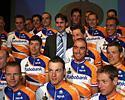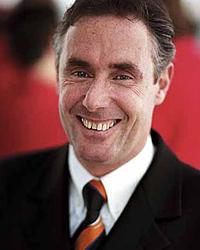
Recently on Cyclingnews.com |
91st Tour de France - July 3-25, 2004
An interview with Theo De Rooij, June 23, 2004
Rich on experience
This year, after having worked as a sports director with the team since 1996, Theo De Rooij took over the helm from Jan Raas to become manager of Rabobank. With their team for the Tour de France selected just a few days ago, Cyclingnews' Gabriella Ekström spoke with De Rooij to find out about life as a decision-maker on one of the world's best teams.
But first, let's set one thing straight, after having seen both spelling versions, is it De Rooy or De Rooij?
"De Rooy is easier than De Rooij, especially for foreigners." De Rooij explains. "I got used to writing my name with 'y' but officially it is 'ij'. Since a couple of years I am using the official version again, but Rooy does not bother me either."
At the end of March, the team's long-time sponsor Rabobank decided to prolong its sponsorship until the end of 2008. The official announcement was made on the morning of Tour de Flanders, and the future should look bright for Theo. Does he have faith in the future?
"I sure have. I have always been an optimistic person and we have a great sponsor with Rabobank. We'll celebrate 10 years engagement with Rabobank next year. This year has felt a bit like a fresh start, with Erik Breukink taking over from me as sports director and giving new impulses to the team. I think things have evolved in a smooth way. Erik is always calm, experienced in cycling and manages to keep a good overview of the team in race situations, despite the fact that he was relatively inexperienced in this new field at the start of the year. On top of this, there's no doubt that our future rests with our young talented riders, both those in our top performing TT3, as well as those in our TT1. They are very important for the teams, our sponsor and for Dutch cycling in general."
Despite a new contract with the sponsor, and good colleagues, it can sometimes be hard to hold your head up if things are not going as planned, but once again, De Rooij turns to his co-workers: "All teams experience some hard times, but we have very good people on board and we have been working together for many years. This gives the team a good balance and when the results are lacking, the confidence in our line of work stays," he says.
"My way of handling stress is by moving and discussing, I have always been someone who 'moves around'. I feel my job is sometimes extremely exciting but I have always stood behind my decisions, even though some few million people may have seen and thought something else about it."
Unlike some teams, Rabobank has been designed to perform in all conditions, and De Rooij guides us through the year. "We are always motivated to perform in any races we compete in, and every phase of the season is interesting. The season starts with new riders and a new challenge: March, with races like Tirreno-Adriatico and Paris-Nice, the Classics in April, and then of course there's the Tour. The Vuelta is also a nice race, without the pressure and stress from the Tour - for the non Spanish teams, that is," notes De Rooij.
"We have always been building a team that can perform in all races that we start in and we want to stimulate riders to take responsibility in those races and by that way create an offensive, attractive team. The spring was successful, with the team taking the first position in the UCI ranking for most of the time and with Freire's Milano- Sanremo win. In all the Classics but Paris-Roubaix, Rabobank riders were competing for the victory, and many more successes, so the spring season has been good for us.
"This year, we are creating a team that is not primarily focused on one top GC rider. Surely with Leipheimer, Rasmussen and Boogerd we have some guys that can be good in the mountains and are capable of achieving a top ten or top five."-A confident Theo De Rooij talks about the team's chances at the 2004 Tour de France |
"It was a pity for Boogerd was confronted with a superb Rebellin and had to settle for second place two times, both in Amstel Gold race and Liege Bastogne Liege. Before this one week in April, Davide Rebellin was a top rider but not the cannibal we got to see in those races. Michael might have been in his best form ever."
Earlier this year, De Rooij spoke about the keystones in the team, and the breathing space allowed between the spring classics and the Tour. In June, we should find ourselves just in that gap.
"Naturally the Tour de France is the most important race for us so we are creating a 'gap', a possibility for the riders to recuperate from the Spring Classics. 'Doing' the Spring Classics might be even harder than finishing a three week stage race. The preliminary Tour selection was made in the beginning of May, with some eleven riders for nine places. The key riders are Rasmussen, Boogerd, Leipheimer, Dekker and Freire. [note: the final selection was announced on June 22, with Freire excluded due to injury-Ed.]

|
"They all play a very important role in the team with their creativeness, experience, and also old-fashioned motivation to dedicate themselves 100 percent to the team if necessary and not to think about personal interest. This year, we are creating a team that is not primarily focused on one top GC rider, like we did last year with Levi. Surely with Leipheimer, Rasmussen and Boogerd we have some guys that can be good in the mountains and are capable of achieving a top ten or top five classification. Last year, after one Tour stage, about 25 percent of the team crashed out, including Levi. We hope the Tour will be open this year, with lots of changing race situations. We do have an aggressive team, capable of performing in such circumstances."
On a more personal note, I'm curious to find out what country has made the strongest impression on De Rooij, after his 24 years as a rider and a sports director.
"Italy is my favourite country to work in, because of the 'ambiance', the spirit, the emotions, the races, the landscape, 'joie de vivre'," he says.
"Another special memory is Tour of Slovakia in 1978. I was the first rider from the west to win that race behind the Iron Curtain. It was special and becomes more special by the year since there is no more curtain left. Some races I used to love were Paris-Roubaix, Amstel Gold, Tirreno-Adriatico and Tour of Switzerland. I also liked to race in countries far away, as a change. I still like these races, only if the 'far away races' can be fitted in our 'European' program."
Despite many years as a rider, De Rooij's future after his professional career wasn't clear. Did he ever think about working with something different than cycling?
"Exclusively! At the end of my career I never thought about the possibility that I could do something in cycling, I wanted to step out and 'do' something with my education." [De Rooij has a business degree, majoring in economics and law]
So how did you get the offer to work as a directeur sportif?
"In the Panasonic Team in 1990 there were a lot of problems. One of the directors at that time, Van den Hautte, stepped out in October and because I was a loyal and 'domestique' type of rider with race intelligence, Peter Post asked me to join the team after having ridden with them for eight years. The staff needed reinforcement with loyal and reliable people at that time."
After having worked with cycling, off the bike, for 12 years, De Rooij still considers his job a very good one. "It is never dull. It offers a lot of variety and positive tension and as a director I have more control over my agenda. I like to ride my bike when I have some time off. To live with cycling for such a long time has helped me mature, and it has made me rich. Not on money, but on experience."
From all your experiences, what is it that you can pass on to the riders you work with today?
"I can teach them the importance of a good structure and stability, and I can use my experience in 'human resources', knowing and feeling how riders are thinking and performing. It's not hard to teach and tell people how to do it'; it all comes down to having good people around you. You need people who are good in the specific fields they are hired for and then make a good team out of it where each rider and member of the staff has his place and importance. It all starts with the selection of the right people."
Over the years as a sport director, a lot of funny incidents have taken place, but De Rooij shares with me one occurrence that he also describes as very sad.
"I was attending an anti-doping control in Belgium with a rider, when the staff took me for a rider as well and wanted to test me. I stopped the procedure just as I was ready to pee. Sometimes the people executing these controls take themselves a little bit too seriously."
Finally, the question that instantly pops into your mind when you have ridden in a team car, and stays there for as long as you keep following cycling. Do you have to be a mad car driver to become a good sport director?
"Quite the opposite! You have to be a very GOOD and behaved driver to be a good D.S. With all the riders between the cars you don't want to take any risks! On the other hand, you have to think and drive as a rider because you must always predict what the riders between the cars want. They also want you to keep the gaps between the cars closed, so it looks quite hectic. However, accidents with riders and team cars involved are very rare; it never happened to me.
"In twelve or thirteen years I have had one serious accident: damaging Giancarlo Ferretti's car in 1996 during Piemonte. I also recall one incident where Aart Vierhouten missed a turn at 50-60 kilometres an hour while getting water bottles in a descent during the Vuelta 1997. It was awesome! I miraculously avoided him when he crashed right in front of my car, slipping out of a left turn. I threw my car aside, completely went over his bike, touching one of his feet with my left front tire, and nearly crashed against the rocks and in the public while doing it. Aart was severely bruised because of the crash but he was able to finish the stage and the Vuelta."

